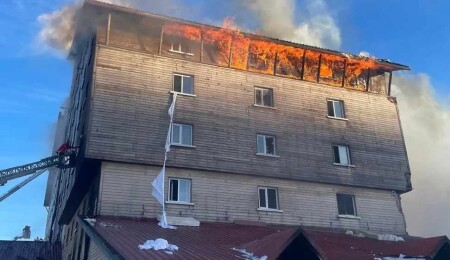Minimal Safety costs Could Have Saved Lives in Bolu Hotel Fire

The deaths in the devastating fire at a popular ski resort in the northwestern province of Bolu could have been prevented if hotel management had allocated 1 million Turkish Liras ($28,000), a mere fraction of its revenue, into fire safety measures, according to calculations by sector experts.

The Justice Ministry on Jan. 23 confirmed that the death toll from the blaze stands at 78, with all victims now identified.
Originating in the kitchen of the 12-story Grand Kartal Hotel on Jan. 21, the fire spread rapidly due to the extensive use of flammable wooden materials throughout the building.
Prosecutors are continuing their investigation into the cause of the conflagration. So far, 11 people have been detained, including the Bolu deputy mayor, the city’s fire chief, hotel's owner, its general manager, director and chief electrician.
Anger has grown in Türkiye, which observed a day of mourning on Jan. 22, amid mounting evidence that negligence may have contributed to the high death toll from the fire.
Allegations of safety failings have dominated Türkiye’s front pages.
According to a report by daily Hürriyet, the estimated cost of implementing essential fire safety measures to control the blaze and prevent fatalities at the 161-room luxury hotel was approximately 1 million liras.
This equates to a cost of 6,210 liras per room — a mere 20 percent of the hotel's nightly accommodation fee, which stood at 30,000 liras per guest.
"Passive fire precautions, designed to mitigate casualties and safeguard property by providing critical evacuation time, are indispensable,” stated Emrullah Eruslu, a prominent industry representative.
Such measures include using non-flammable materials on exterior facades, ensuring fire-resistant doors in escape corridors and staircases and utilizing fireproof insulation around exhaust systems.
He noted that in structures like schools, hospitals and hotels, the cost of passive fire prevention typically constitutes a mere 0.3 to 0.5 percent of the total construction cost — a negligible figure.
Comparatively, the total expenditure required for a comprehensive fire safety system in such an establishment remains minimal when juxtaposed with the revenue generated from a single night’s accommodation.
However, many survivors told the same story: There were no fire alarms, no safety exits and no fire doors in the hotel, leaving scores of people trapped inside.
There were safety failures on multiple levels in the ski resort of Kartalkaya, the head of the Ankara Chamber of Architects said.
"There is an alarm system but we know it was not working. There should also have been a sprinkler system activated by the alarm to help the fire extinguishing process," Derya Başyılmaz said.
Commercial kitchens were legally obliged to adhere to strict safety regulations and must have sprinkler systems, which was not the case at the Grand Kartal.
The hotel's picturesque location on the mountain top edge of a ski slope also complicated rescue efforts.
Source: HDN


Comments
Attention!
Sending all kinds of financial, legal, criminal, administrative responsibility content arising from illegal, threatening, disturbing, insulting and abusive, humiliating, humiliating, vulgar, obscene, immoral, damaging personal rights or similar content. It belongs to the Member / Members.